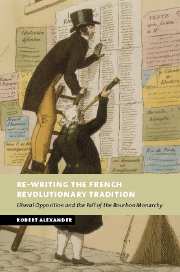 Re-Writing the French Revolutionary Tradition
Re-Writing the French Revolutionary Tradition Book contents
- Frontmatter
- Contents
- List of maps
- List of tables
- Acknowledgements
- List of abbreviations used in notes
- Map 1 The departments of France and their capitals in 1814
- Map 2 The Haute-Garonne
- Map 3 The Isère
- Map 4 The Bas-Rhin
- Map 5 The Seine-Inférieure
- Introduction: Open questions
- 1 False starts and uncertain beginnings: from the First Restoration (May 1814) to the elections of September 1816
- 2 Battle commences: from September 1816 to July 1820
- 3 Self-defeating opposition: from July 1820 to February 1824
- 4 Back on track: from March 1824 to January 1828
- 5 Towards victory?: from January 1828 to July 1830
- 6 Aftermath: Liberal Opposition and the July Revolution
- Conclusion: Revolutionary tradition
- Bibliography
- Index
- NEW STUDIES IN EUROPEAN HISTORY
1 - False starts and uncertain beginnings: from the First Restoration (May 1814) to the elections of September 1816
Published online by Cambridge University Press: 04 December 2009
- Frontmatter
- Contents
- List of maps
- List of tables
- Acknowledgements
- List of abbreviations used in notes
- Map 1 The departments of France and their capitals in 1814
- Map 2 The Haute-Garonne
- Map 3 The Isère
- Map 4 The Bas-Rhin
- Map 5 The Seine-Inférieure
- Introduction: Open questions
- 1 False starts and uncertain beginnings: from the First Restoration (May 1814) to the elections of September 1816
- 2 Battle commences: from September 1816 to July 1820
- 3 Self-defeating opposition: from July 1820 to February 1824
- 4 Back on track: from March 1824 to January 1828
- 5 Towards victory?: from January 1828 to July 1830
- 6 Aftermath: Liberal Opposition and the July Revolution
- Conclusion: Revolutionary tradition
- Bibliography
- Index
- NEW STUDIES IN EUROPEAN HISTORY
Summary
TUMULTUOUS POLITICS AT THE NATIONAL LEVEL
Uncertainty shrouded the First Restoration. Most historians have concluded that the First Treaty of Paris, signed on 30 May 1814, was relatively lenient: France was reduced to her 1792 frontiers and lost colonies in the West Indies and the Indian Ocean, but would not have to pay reparations. The French, however, had grown accustomed to victory under Napoleon and what was lost was at least as apparent to them as what had been salvaged. Talleyrand would represent France at the Vienna Congress, but it was by no means clear that la grande nation would have much say in the post-war settlement. Wounded patriotism, thus, posed unsettling questions for a regime installed by the Allied powers.
Perhaps the prospect of peace might have enabled the Bourbon monarchy to entrench itself, had the government not exacerbated tensions by committing a series of errors. There was little immediate administrative purge at the start of the First Restoration; 76 per cent of the Imperial corps was maintained. By February 1815, however, the Minister of the Interior, the abbé François-Xavier de Montesquiou, was asking prefects for lists with comments on the worthiness of fonctionnaires, and change was accelerating. More potentially explosive were alterations in the army. Reduction by about three-fifths was perhaps not a great danger where common soldiers were concerned; many of the latter had simply melted away in the face of defeat.
- Type
- Chapter
- Information
- Re-Writing the French Revolutionary TraditionLiberal Opposition and the Fall of the Bourbon Monarchy, pp. 30 - 80Publisher: Cambridge University PressPrint publication year: 2003


